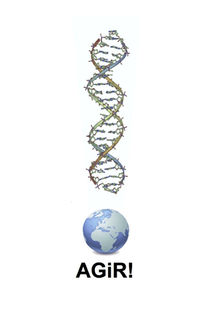Difference between revisions of "AGiR! for genomic integrity"
| Line 14: | Line 14: | ||
== Introduction == | == Introduction == | ||
=== Context === | === Context === | ||
| − | This is a part of a new Hackuarium project on genomic integrity | + | This is a part of a new Hackuarium project on genomic integrity |
| − | + | This wiki page will help keep track of development of simple protocols for two methods around which to build experiments related to simple quantitation of DNA damage in human cells. | |
=== People === | === People === | ||
| Line 31: | Line 31: | ||
== Background & Inspiration == | == Background & Inspiration == | ||
Here is the link to the Prezi Rachel presented (13apr16) at an Open hackuarium night! | Here is the link to the Prezi Rachel presented (13apr16) at an Open hackuarium night! | ||
| − | + | [http://prezi.com/r9zepj_-emx-/diybio-for-genomic-integrity/ Prezi on DIYbio for Genomic integrity!] | |
=== Some theory needed ? === | === Some theory needed ? === | ||
| + | more on comet cells and micronuclei to come soon! | ||
=== Inspiration / References / Similar projects === | === Inspiration / References / Similar projects === | ||
| − | Inspiration: good pages | + | Inspiration: good pages to come |
* [http://] | * [http://] | ||
* [Link 2] | * [Link 2] | ||
| − | |||
| − | |||
=== Setup description === | === Setup description === | ||
General principle: | General principle: | ||
| − | |||
| − | |||
=== Materials & budget === | === Materials & budget === | ||
* What, size | quantity | where to get it | price / unit | * What, size | quantity | where to get it | price / unit | ||
| − | |||
| − | + | ==== (If it’s an experiment) Parameters ==== | |
| − | + | ;To get baselines first | |
| − | |||
| − | |||
| − | |||
| − | + | then To vary | Values | |
| − | |||
: p1 | | : p1 | | ||
: p2 | | : p2 | | ||
Revision as of 20:25, 14 April 2016
Genomic integrity is a new 'big picture' concept to aid public health efforts and basically includes all the molecular genetic details of cells!
So many things we commonly choose to do can impact genomic integrity, also potentially affecting future generations!
At the Hackuarium, AGiR! hopes to really get some citizen science action going - developing DIYbio methods to readily assay *your very own* cells for DNA damage, using classic (circa 1980s) techniques. If these can still be sold in 'kits,' maybe it will also be simple to make them available to all for open source efforts?
Here is the basic plan: using inner cheek cells for micronuclei and comet assays!
Watch this space for more info and visit
the AGiR! site
Introduction
Context
This is a part of a new Hackuarium project on genomic integrity This wiki page will help keep track of development of simple protocols for two methods around which to build experiments related to simple quantitation of DNA damage in human cells.
People
Contact and lead: Rachel Aronoff
Participants: maybe you?!
Objectives
- Objective
- Setup in short
Background & Inspiration
Here is the link to the Prezi Rachel presented (13apr16) at an Open hackuarium night! Prezi on DIYbio for Genomic integrity!
Some theory needed ?
more on comet cells and micronuclei to come soon!
Inspiration / References / Similar projects
Inspiration: good pages to come
- [http://]
- [Link 2]
Setup description
General principle:
Materials & budget
- What, size | quantity | where to get it | price / unit
(If it’s an experiment) Parameters
- To get baselines first
then To vary | Values
- p1 |
- p2 |
- Constants (Key elements of set-up)
- c1 |
- c2
- To measure/ observe
- m1
- m2
Protocol (Plan)
Startup
Phase 1
do what | frequency | duration
Lab Notebook & News (Real)
We put our measures here: [link to other doc?]
Run / prototype #2
What's new compared to #1:
